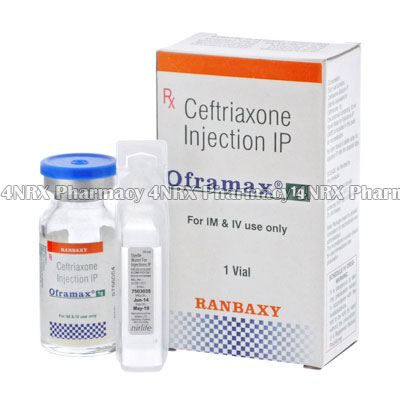 |
Home  Infection Infection  Oframax Injection (Ceftriaxone) Oframax Injection (Ceftriaxone) |
|
|||||||||
|
|
Oframax Injection (Ceftriaxone)
What is Oframax Injection (Ceftriaxone) used for? Oframax Injection (Ceftriaxone) is an injectable cephalosporin antibiotic prescribed for the treatment of bacterial infections including serious or life threatening infections. The medication slows or prevents the reproduction of bacteria cells allowing the immune system can control or eliminate the infection. This makes it useful for treating bacterial meningitis, pneumonia, gonorrhoea, bacterial blood infections, or bacterial infections of the skin or soft tissues. Your doctor may also prescribe this medication for the treatment of other unlisted conditions. How should I use Oframax Injection (Ceftriaxone)? Oframax Injection (Ceftriaxone) is normally administered by a doctor or another fully trained health care professional in a hospital or clinic. In some rare cases, you may be required to perform your own injection. Make sure you are fully trained in the correct procedure to prevent serious complications that may occur. Sterilize the injection site and needle before each use. Collect the prescribed amount of solution into the syringe, remove any air by holding it upright and pressing the plunger until a small amount of liquid emerges, and slowly inject the medicine into a vein or muscle. Attend any follow up appointments indicated by your doctor to ensure the entire infection is destroyed. Always observe the solution before each use to ensure it is not cloudy or discoloured as this may indicate contamination. Ask your doctor or pharmacist any questions you have about the medicine to ensure the correct administration. What are the side effects of Oframax Injection (Ceftriaxone)? Oframax Injection (Ceftriaxone) may cause side effects in some patients such as:
Serious side effects that may require emergency medical attention include fever, flu symptoms, sores appearing in or around the mouth, sensitive skin, easier bruising, increased bleeding, severe diarrhoea that is bloody or watery, discoloured stools, darkened urine, urinary retention, jaundice, severe skin rashes, or a severe reaction affecting the injection site. Immediately inform your doctor as soon as you experience any serious side effects to make sure the correct adjustments are made to your dosage or application frequency to prevent more health problems from occurring. Please Note Oframax Injection (Ceftriaxone) should not be administered to patients who are babies less than one month old, allergic to cephalosporin antibiotics, who have had a bad reaction to similar treatments, or who have had immediate reactions to penicillin antibiotics. Also inform your doctor if you have any allergies to penicillin antibiotics, reduced liver function, decreased kidney function, or if you are on a controlled sodium diet. These conditions may cause unexpected health problems requiring adjustments to your regimen. Strictly use Oframax Injection (Ceftriaxone) as prescribed and follow all instructions provided by your doctor. Safe, suitable, and optimum dosage can vary and is dependent on the patient`s health and medical history, as well as the condition you are treating. Oframax Injection (Ceftriaxone) may not be safe or suitable for all patients. Always ensure your doctor is informed if you are pregnant or breastfeeding, using any other type of medication (including non-prescription medicine, vitamins, and supplements), as well as if you have any allergies, other illnesses, or pre-existing medication conditions. Seek immediate medical attention or proceed to your nearest accident and emergency department if you suffer a hypersensitive or allergic reaction. Symptoms usually present during a reaction of this nature include difficulty breathing or swallowing, swelling of the limbs or face, tight chest, hives, and skin rashes. 
|
||||||||||||||||||